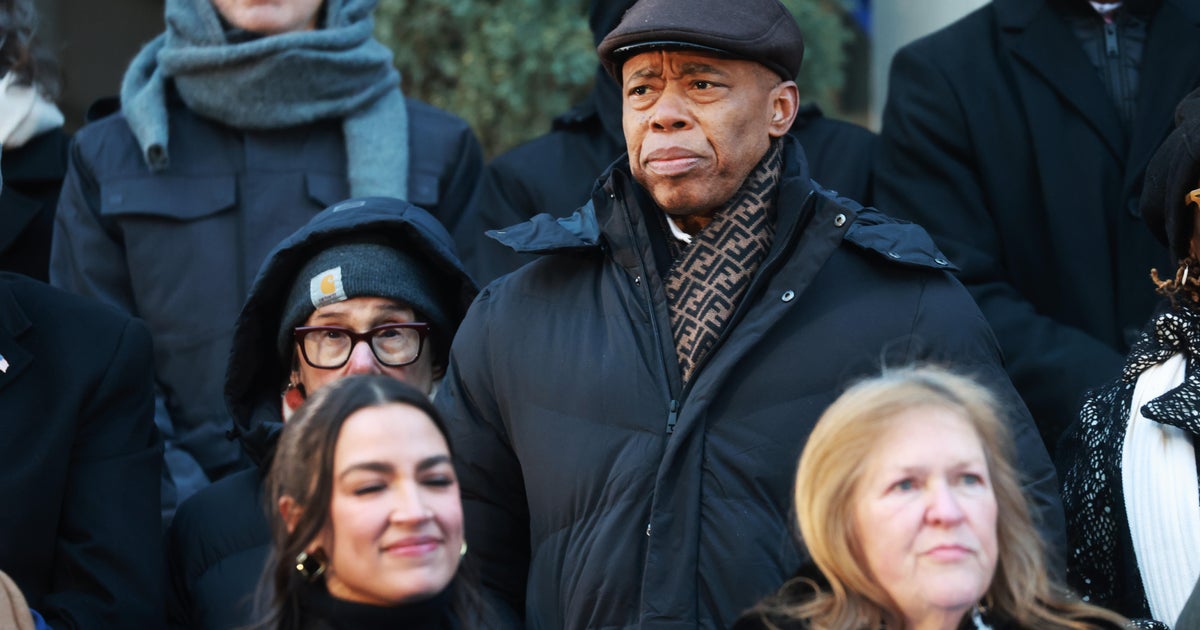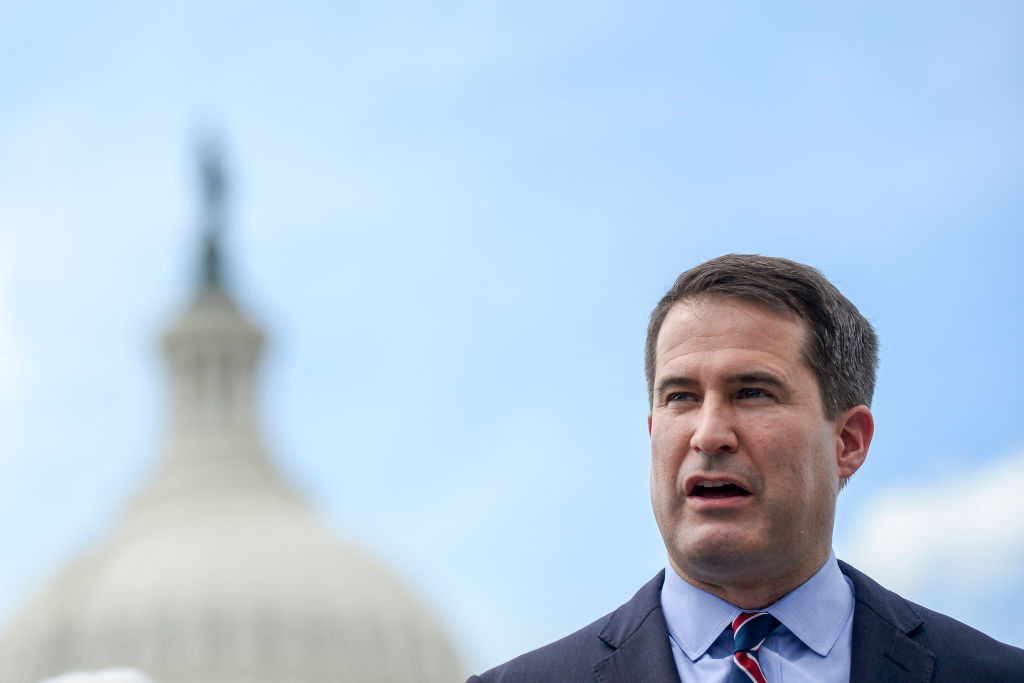Transcript: Rep. Adam Schiff on "Face the Nation," May 19, 2019
The following is a transcript of the interview with Democratic Rep. Adam Schiff of California that aired Sunday, May 19, 2019, on "Face the Nation."
MARGARET BRENNAN: And we do want to get some input from a key member of Congress that is Democrat Adam Schiff, the chair of the House Intelligence Committee. He joins us here in studio as well. Congressman let's pick up right on this. You heard this description of an immediate crisis, this ask for four-and-a-half billion dollars that the administration says it- it so desperately needs, almost- almost a hundred thousand people per month. Why isn't there more immediate action from Democrats?
REP. ADAM SCHIFF: Well, there is a humanitarian crisis at the border, but part of this crisis is one of the administration's own making. This is an administration as you point out that is saying we're going to cut off assistance to these Central American countries, that would be useful in trying to stem this flow of migration, dealing with the problems. The acting director talked about the pull but little about the push, and the push factor is that the violence in Central America is pushing people towards our country who are escaping violence and- and threats to their children. We need to deal with that and threats to cut off aid isn't helping. When you look at El Salvador for example, they are making progress, we should be expanding assistance like that mirroring those programs in other countries. The administration isn't doing this and- and what's more--
MARGARET BRENNAN: But what about the four-and-a-half billion needed for people who have already made it to U.S. soil and that- that are arguably it- it's up to the American people to provide for?
REP. SCHIFF: We're discussing adding to the emergency supplemental appropriations bill of funding for this humanitarian crisis. And I think there is a receptivity to do that, to deal with humanitarian issues, not though just to send more money to build a wall, not to just merely detain people and add to the incarceration of people. You know, we learned just within the last few days that the number of children that had been separated from their parents could be thousands more then we learned and the administration still doesn't know where they are. And you see this kind of disarray in what the administration is doing, announcing they're going to send people to Florida then- then pulling that back and- and by the way, the only reason they're pulling that back is because a Republican governor has challenged this idea. So this- this looks a lot like the sanctuary cities kind of push by the president which is we'll send them to whatever states we don't care about and if we get pushback from a Republican governor we'll reconsider. But again you know, one of the steps they're doing at the- at the border that's making this so much worse is they're slowing down the processing of asylum seekers at legal ports of entry which only encourages people to go between the legal ports of entry. So lots of counterproductive steps by the administration that seems really intent on making this problem worse.
MARGARET BRENNAN: I want to ask you about Iran, you're one of the very few members of Congress who was briefed on the intelligence that the U.S. responded to with this military buildup. I know you can't talk about classified matters but is the military response thus far commensurate with the threat that was described to you?
REP. SCHIFF: Well look, the- the intelligence does show an increased threat and it would be, I think, catastrophic for Iran to use violence against any of our troops, any of our allies. But it's not just about the intelligence. What is taking place now was all too predictable. The steps the administration has taken to renege on the Iran agreement, to try to force Europe to renege on the Iran agreement, to try to force Iran to withdraw from the agreement to go back to the path of enrichment, the designation of the IRGC as a terrorist group, the belligerent rhetoric from the administration from Pompeo, from Bolton.
MARGARET BRENNAN: The policy decisions--
REP. SCHIFF: All of- all of these policy decisions have led us to a state where confrontation is far more likely and that cannot be ignored. When you take a series of steps that, yes, ratchet up tensions, you shouldn't be surprised when the intelligence tells you, "Hey tensions have been ratcheted up. It's now more a risk of confrontation." And this is why our allies are departing from us. This is why our allies increasingly are isolating us and not Iran. And I don't see how these policies have made this country any more safe. They haven't. And I think we miss that bigger picture when we simply focus on, is the intelligence accurate or inaccurate. The problem is that this ratcheting up of tensions was all too predictable, all too calculated by people like Bolton and Pompeo and it has led us to the- the precipice of potential catastrophe.
MARGARET BRENNAN: Speaker Pelosi has previously said that for her the standard for impeachment requires a bipartisan level of support for it. We saw yesterday the very first Republican, Justin Amash, who is a libertarian, he is no fan of the president, but still a Republican. He suggested that the president has carried out impeachable behavior. Does this meet the Democratic standard, now, to consider and move forward with an impeachment inquiry?
REP. SCHIFF: Well I think that what the Speaker has referred to and I have as well, is can an impeachment even be potentially successful in the Senate? We see no signs of that yet. And you know, I respect what Justin Amash is doing and has said. He showed more courage than any other Republican in the House or Senate. But what may be pushing us in the direction of impeachment in any event has less to do with Justin Amash and more to do with the fact that the administration is engaging in a maximum obstructionism campaign against Congress.
MARGARET BRENNAN: You do think there is more of a movement--
REP. SCHIFF: I- I--
MARGARET BRENNAN: --towards impeachment?
REP. SCHIFF: I think that we are seeing more members that recognize that the administration is acting in a lawless fashion, essentially having obstructed justice, is now obstructing Congress and our lawful function. And if we conclude that there's no other way to do our jobs, no other way to do the oversight, no other way to show the American people what this president has done, his- his unethical and illegal acts as outlined in the Mueller Report, then we may get there.
MARGARET BRENNAN: You're- what- what you're suggesting just to clarify, is that by opening up an inquiry into impeachment- proceedings into impeachment, it would allow you to get the information even- and evidence you've been asking for?
REP. SCHIFF: It may--
MARGARET BRENNAN: But it provides a tool even if it fails?
REP. SCHIFF: It- it- it does, it provides an additional tool. And what we have been doing is we have been gradually escalating the- the tactics we need to use to get information for the American people. So we began by asking for voluntary cooperation and that was not forthcoming. We followed with subpoenas, we followed with contempt, we may follow with inherent contempt, and we may have to follow with impeachment. There may be an odd confluence of interest here between the Trump Administration and people around the president who want him impeached because they think it's politically advantageous. And an increasing number of Democrats and maybe Republicans who feel this president's conduct is so incompatible with office, incompatible with our system of checks and balances that if the only way that we can do our oversight is through an impeachment proceeding then maybe we have to go down that road. But I think it'll be important to show the American people this was a decision made reluctantly.
MARGARET BRENNAN: Okay--
REP. SCHIFF: This is a decision forced upon us rather than something we were eager to embrace.
MARGARET BRENNAN: Congressman, we have to leave it there. Thank you very much.
REP. SCHIFF: Thank you.



